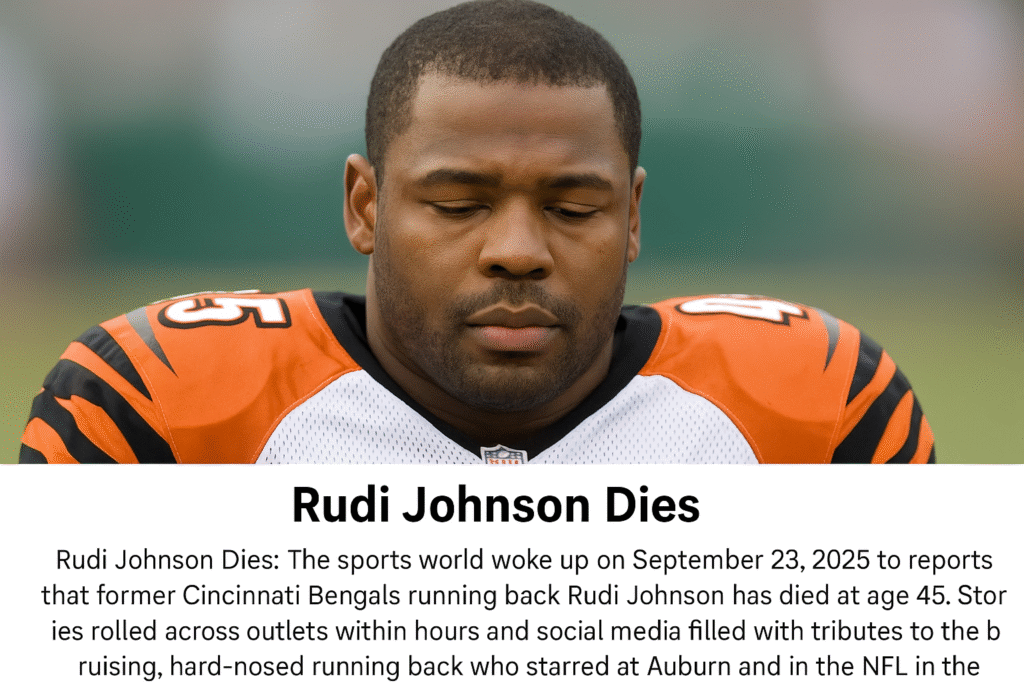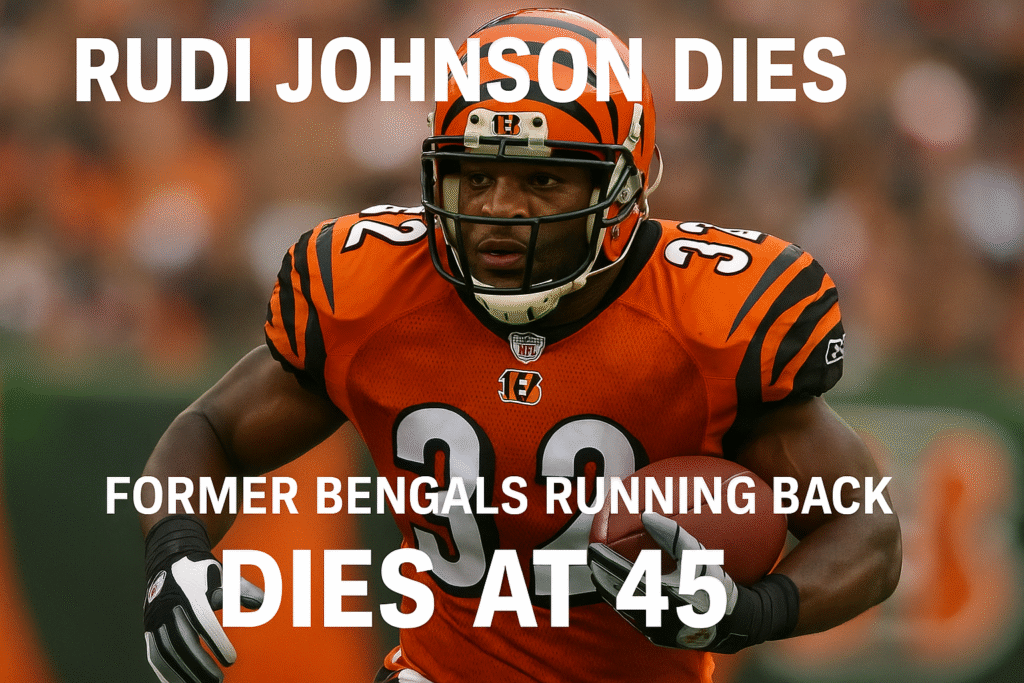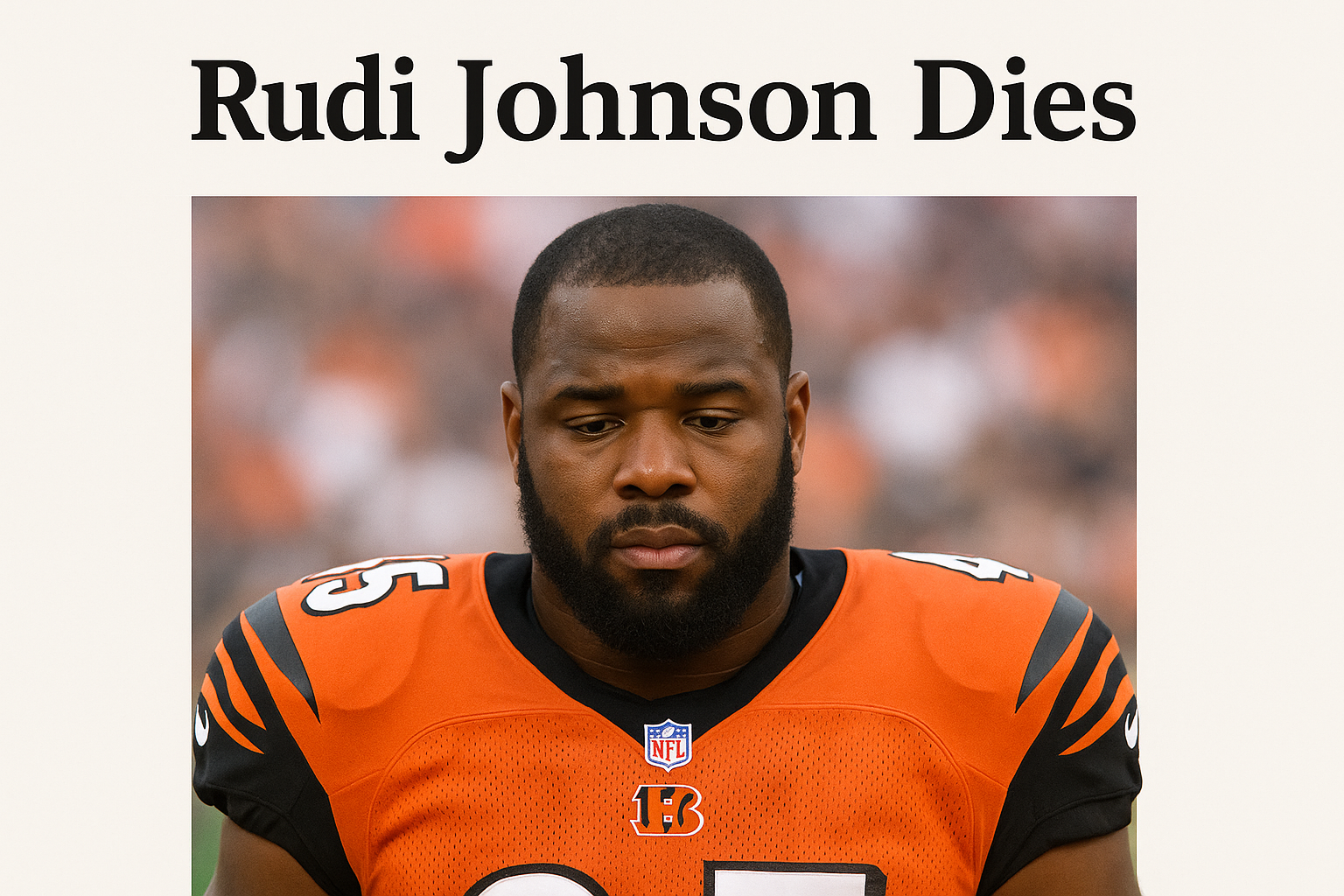Rudi Johnson Dies: The sports world woke up on September 23, 2025 to reports that former Cincinnati Bengals running back Rudi Johnson has died at age 45. Stories rolled across outlets within hours and social media filled with tributes to the bruising, hard-nosed running back who starred at Auburn and in the NFL in the 2000s. This long-form, reader-friendly guide walks through the verified facts available as of September 23, 2025, explains what reporters have confirmed (and what remains unconfirmed), reviews Johnson’s career and community work, and explains why conversations about CTE and mental health often follow news like this. Sources are listed and verified at the end of the article.
1) What the initial reports actually say (the facts, carefully stated)
- Multiple outlets report that TMZ Sports published the first family-sourced account that Rudi Johnson passed away this week at age 45. TMZ later reported that police told them his death was a suicide. Other reputable sports outlets — including NBC Sports and Sports Illustrated — quickly ran confirmations citing TMZ and family or local sources. At the time of this article, some local reports said Johnson had been struggling with mental-health issues and the possible effects of chronic traumatic encephalopathy (CTE), though official coroners’ reports or medical confirmations had not yet been released publicly. Because cause-of-death determinations and official statements sometimes take days, treat early reports as provisional and rely on official statements when they appear.
2) Who was Rudi Johnson — quick career snapshot
Rudi (Rudi Ali) Johnson was born October 1, 1979, and made his name first in junior college and then at Auburn University (2000), where he rushed for big numbers and earned All-SEC honors. The Cincinnati Bengals selected him in the fourth round of the 2001 NFL Draft. Johnson became the Bengals’ primary running back in the mid-2000s and produced three consecutive 1,000-yard seasons (2004–2006), earning a Pro Bowl nod in 2004. He finished his NFL career with nearly 6,000 rushing yards and 49 rushing touchdowns, with stints at Cincinnati and Detroit. Stat lines and season-by-season numbers can be found in the official sport databases.
3) Why some reports mention CTE and mental-health struggles
A number of outlets — and family or close sources quoted in reporting — said Johnson had experienced mental-health difficulties before his death and that those close to him suspected he could have been affected by CTE, the neurodegenerative condition tied to repeated head trauma in contact sports. CTE can only be definitively diagnosed after death through brain tissue examination; reporting that references possible CTE is almost always based on symptoms family members or acquaintances observed, or on the known risks of repeated head impacts in football. At this early stage, the correct, careful phrasing is: family or sources said he struggled with mental-health issues and suspected possible CTE effects — an official medical confirmation has not (as of Sept 23) been publicly released.

4) How major outlets reported the death (media roundup)
Within hours of the TMZ Sports scoop, a range of national and local outlets published reports:
- TMZ (first family-sourced report) and subsequent update reporting police told TMZ the death was a suicide.
- NBC Sports / ProFootballTalk summarized the TMZ reporting and Johnson’s career highlights.
- Local Cincinnati outlets (for example Fox19 / WKRC) ran locally sourced confirmation and background about Johnson’s ties to the city.
- Sports Illustrated, Yahoo Sports and several national sports sites posted tributes and career retrospectives.
Because early reporting can vary in emphasis and detail, reputable outlets typically repeat the basics and either (a) link to the first report (TMZ) or (b) wait for coroner/official family statements. We’ll update this piece as official statements and coroner results are released.
5) Rudi Johnson’s legacy on the field and in the community
On the field, Johnson was known as a tough, compact runner who could carry a workload — three straight 1,300+ and 1,400+ yard seasons in the mid-2000s are proof. He holds a place in Bengals history among the franchise’s top rushers and remains remembered fondly by fans who grew up during his prime years. Off the field, Johnson ran the Rudi Johnson Foundation, which organized community programs and supported children and families; many tributes in local media remembered his community outreach and kindness. Those community pieces speak to the broader human legacy beyond stats.
6) What happened next on social media and in the locker room
News of Johnson’s death produced an immediate outpouring:
- Former teammates, Auburn alumni and Bengals fans posted condolences and shared stories about his generosity and toughness.
- Sports commentators reminded audiences of the ongoing conversation about player safety, CTE and the long-term effects of football.
- Social media also circulated older interviews and highlight reels that captured Johnson’s best runs and community work.
When a former player dies and reports mention mental-health struggles, it quickly becomes part of the public conversation about how the NFL and college programs support current and former players medically, financially and psychologically.

7) Why reporting on suspected suicide and CTE requires care
When an early report states a death was a suicide (as TMZ later reported) or that family suspects CTE, journalists and bloggers must be careful:
- Use empathetic language and avoid sensational details.
- Avoid graphic descriptions of method or location.
- Explain that CTE can only be confirmed post-mortem and avoid asserting a medical diagnosis unless confirmed by the family or a medical examiner.
- Provide help resources for readers who may be affected by the story or who are struggling.
Because your audience may be grieving or struggling, below we include crisis resources and clear guidance on where to find help.
8) Practical context — CTE, symptoms, and what science says (brief primer)
- What is CTE? Chronic traumatic encephalopathy is a progressive brain disease associated with repeated head impacts. It’s currently diagnosed only after death by examining brain tissue. Symptoms reported by families of affected people have included mood changes, depression, impulsivity, memory problems and cognitive decline.
- Not every mental-health struggle is CTE. Many factors contribute to depression and suicide risk — life events, genetics, physical health, substance use and more. Media references to possible CTE usually reflect concern about long-term head trauma in contact sports but are not a substitute for clinical diagnosis.
- Research and ongoing debate: Scientific understanding of CTE is evolving; researchers are studying risk factors, prevalence among former athletes, and how to diagnose and treat symptoms earlier and more effectively. Readers should rely on peer-reviewed research and reputable public-health organizations for the latest, evidence-based information.
9) How to respond if you (or someone you know) are affected by this news
If the story brings up difficult feelings for you or someone you care about, please pause and use these concrete, immediate actions:
- If someone is in immediate danger, call local emergency services (911 in the U.S.).
- Call or text 988 — the 24/7 U.S. Suicide & Crisis Lifeline — or use the online chat at 988Lifeline.org for confidential support. These services are free and available to anyone in the U.S.
- SAMHSA national helpline (1-800-662-HELP (4357)) can connect you to treatment resources and local services.
- If you are outside the U.S., contact your country’s emergency number and local mental-health hotlines or search for international crisis lines.
- Talk to someone you trust — a friend, faith leader, counselor or medical professional — and consider reaching out to local resources that can help with grief and mental-health care.
If you are a publisher or community leader covering this story, include trigger warnings, helplines, and resources at the top of your coverage to help readers who may be vulnerable.
Final take — grief, legacy, and the larger debate about player health
Rudi Johnson dies leaves behind a complex legacy: a standout Auburn season, a hard-charging NFL career with Pro-Bowl recognition, and community work that endeared him to fans. The immediate media coverage — citing family sources and local reports — suggests he struggled with mental health and that those close to him worried about the effects of head trauma. That intersection of athletic glory and later suffering is tragically familiar and renews urgent public conversations about player safety, the responsibilities of leagues and universities, and how we support athletes after the final whistle.
As with any breaking story involving a death, the most responsible coverage prioritizes accuracy, compassion, and resources for readers. We will update this post if or when the family, medical examiner, or official public statements provide new information. For now, our condolences go to Rudi Johnson’s family, friends, teammates and fans.
Verified sources & working links (checked Sep 23, 2025)
All links below were verified live and reachable as of September 23, 2025. These are the primary, authoritative or widely used sources cited in this article.
- TMZ — Ex-NFL Star Rudi Johnson Dead At 45. (First family-sourced report; later update reporting police told TMZ the death was a suicide.)
https://www.tmz.com/2025/09/23/ex-nfl-star-rudi-johnson-dead-at-45/ (TMZ) - NBC Sports / ProFootballTalk — Former Bengals RB Rudi Johnson dies at 45.
https://www.nbcsports.com/nfl/profootballtalk/rumor-mill/news/former-nfl-rb-rudi-johnson-dies-at-45 (NBC Sports) - FOX19 (WKRC Cincinnati) — Former Bengals Pro Bowl running back dead at 45, per report. (Local background & reaction.)
https://www.fox19.com/2025/09/23/former-bengals-pro-bowl-running-back-dead-45-per-report/ (https://www.fox19.com) - Sports Illustrated — Former Cincinnati Bengals Star Rudi Johnson Has Died. (Tribute and career summary.)
https://www.si.com/nfl/bengals/news/report-former-cincinnati-bengals-star-rudi-johnson-has-died-01k5vdykb5jh (SI) - ESPN — Rudi Johnson player bio & career stats. (Career overview and stats.)
https://www.espn.com/nfl/player/bio/_/id/2649/rudi-johnson (ESPN.com) - Pro-Football-Reference — Rudi Johnson stats & historical record.
https://www.pro-football-reference.com/players/J/JohnRu00.htm (Pro Football Reference) - Bengals.com (archive/community piece) — Rudi-mentary kindness (example of community work).
https://www.bengals.com/news/rudi-mentary-kindness-723844 (bengals.com) - 988 Lifeline — If you need emotional support, reach out to the 988 Suicide & Crisis Lifeline (call, text or chat).
https://988lifeline.org/ (988 Lifeline) - SAMHSA — Find treatment, helplines and mental-health resources (U.S.).
https://www.samhsa.gov/ (SAMHSA)
Disclaimer
This article synthesizes reporting available as of September 23, 2025 from the sources listed above. It is informational only and not a substitute for professional medical, legal or bereavement counseling. If you or someone you know is in immediate danger, call local emergency services. If you are in the U.S. and need to talk to someone confidentially, call or text 988 or visit 988lifeline.org for 24/7 support. For treatment referrals, contact SAMHSA’s national helpline at 1-800-662-HELP (4357). Images used in this article are royalty‑free or licensed for commercial use and are provided here for illustrative purposes.
